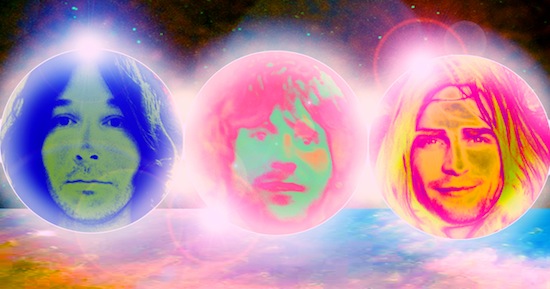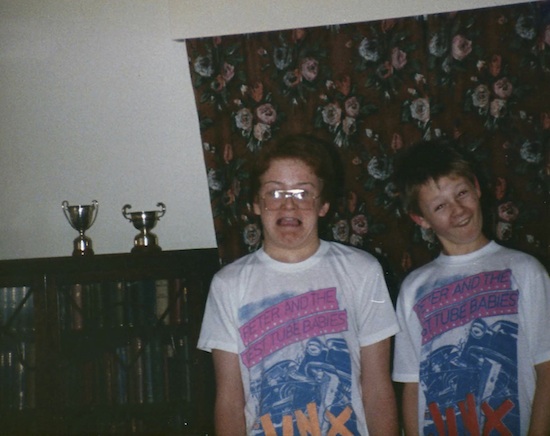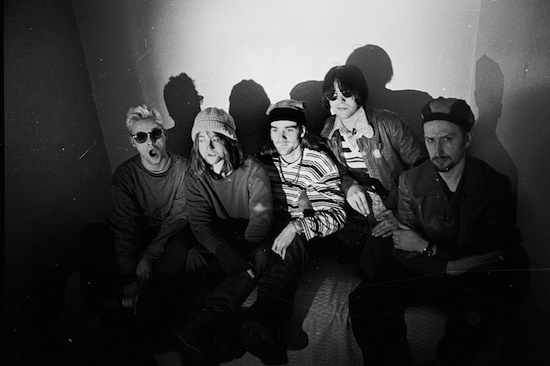"Happy every day as I walk around my life, happy every day even though I’m stuck in Fife…"
(The Aliens, ‘The Happy Song’)
Sometimes the author does not pursue fables, but rather finds himself within them. And so it is with Vic Galloway’s terrific pop chronicle, Songs in the Key of Fife, which unlocks the musical lives, and loves, of a seemingly disparate sonic rabble – The Beta Band, King Creosote, The Aliens, James Yorkston, KT Tunstall, Lone Pigeon and The Pictish Trail among them. The book salutes their deviance, explores their commonalities (a penchant for 50s rock ‘n’ roll, an abiding DIY / punk ethos, a life largely spent in the East Neuk of Fife) and locates Galloway’s singular place at the heart of their stories: the writer, broadcaster and musician grew up with some of these artists, and has since played in bands, toured and recorded with many more.
"I’m not ‘going on a journey’. I’m trying to tell the intertwining tales of some truly talented people who grew up in the same area … This is not a perfect historical document, neither is it the definitive telling of these tales. It is what it is and, to my knowledge, it’s the first time these stories have been told properly. I simply wanted to get it all down." (Vic Galloway, Songs in the Key of Fife, Introduction)
And so he does. From childhood games of Star Wars with The Beta Band’s Steve Mason and an infant combo, The Cows, with James Yorkston, to his peripatetic bluegrass-punk exploits in King Creosote’s 90s troupe Khartoum Heroes, Galloway charts our motley crew’s histories and escapades – and, by extension, relays his own – in a dayglo tome that excavates and celebrates the landscape of a remote Scottish coast, from which strangely grew (and grows) a fantastic(al) subculture.
Songs in the Key of Fife is equal parts alt-pop family tree and DIY Tales of the Unexpected, (un)covering such specialist subjects as the enduring influence of Adam and the Ants on the book’s protagonists; and documenting mythical sagas like the night Steve Mason pinned Fred Durst up against a wall before slamming Limp Bizkit for being "shit", or the time the Lone Pigeon and his brother King Creosote unearthed a bag of mysterious psychedelic pills during a Beth Orton performance at T in the Park – the sampling of which resulted in KC coming round barefoot the next day, his forehead branded with a cross. “Those pills,” writes Galloway, ever the congenial narrator, "lasted them the rest of the summer …"

Songs in the Key of Fife features extensive interviews with all of its featured artists, from The Beta Band to KT Tunstall, but you mention Steve Mason took quite a bit of convincing – how did you persuade him to participate?
Vic Galloway: Yeah, I checked with all the musicians before I started writing the book – firstly that they were up for me writing it, and secondly that they’d be happy to contribute. And they all said yes, except for Steve, who went, "Well, my music’s as informed by London, and New York, as it is by Fife." So I basically had to sit down and go, "Steve, if you want that to come across, that’s what I’ll write. But you are integral to this story. You’re from St Andrews, we played Star Wars figures as a kid, you were in a band with James Yorkston when you grew up [high-school troupe Nicht Verkrampte], you’ve been two bands with Gordon [Anderson, aka Lone Pigeon], you’ve been in a band with Een [Anderson, aka Pip Dylan], you’ve produced King Creosote records, you’ve played at various [Fence Collective] Homegames" – and by the end of the list he went, "Alright alright, I’ll do it."
And also, Steve can say that Fife hasn’t influenced him that much, but the humour’s there, and there are certain themes and connections between all of the characters in the book, even though they’re an eclectic bunch of people – like rock ‘n’ roll, busking, DIY – all sorts of things that tie everyone together. And of course, the reason Kenny [Anderson, aka King Creosote] and Een played 50s rock ‘n’ roll, and the reason James [Yorkston] and I did, and the reason Steve Mason did – and even, later on, the reason KT Tunstall did – was because it’s quite easy to pick up a guitar. Once you’ve learned three chords, it’s easier to sound like Eddie Cochrane or Elvis or Little Richard and knock out an effective version of that than pretty much anything else. It’s really simple, it’s really basic, and you can really make it sound like that.
"Steve Mason recalls: ‘One day I had an epiphany playing an old acoustic guitar. The day I worked out the basic opening line from the Sex Pistols’ ‘Anarchy in the UK’, music seemed more real. “I can actually do this!” It opened up a new world of possibilities and a new kind of magic.’" (Vic Galloway, Songs in the Key of Fife, page 30)
I think that Steve Mason quote is at the heart of the book and its characters, in many ways. There’s a recurring sense of musical anarchy; of (post) punk defiance, as rendered through whatever instruments were lying around (banjos, squeezeboxes, washboards) – from James Yorkston’s unplugged motorik, through The Beta Band’s Flower Press fanzine series, to the borderline-Situationist pranks of King Creosote’s Fence Collective. [See Quietus feature Circle of Fife for evidence of the latter.]
VG: Yeah, it’s funny – in the book, Steve Mason says, "I always thought the Beta Band were like the Sex Pistols”, and conceptually I know exactly what he means: punk is what you make it. Freedom of expression, two fingers up at the establishment, fuck you, I’ll do exactly what I want, how I want to do it – all of that. Some people would go, “That’s not punk, that’s art-rock or that’s freaky avant-garde pop," but it is.
"Johnny Lynch [The Pictish Trail] explains: ‘I was still buying mainly mainstream indie records, and then I heard the Beta Band … I found them quite haunting and very odd. I was singing along to it and I thought, “I could do this.” It was kind of my punk moment, I suppose. I assume it was the same when people heard the Sex Pistols – “let’s start a band!’" (Vic Galloway, Songs in the Key of Fife, page 243)
VG: I think Steve Mason was a punk – it was in his DNA. It was certainly in my DNA, and it was certainly in James Yorkston’s DNA, we were punks. Nice middle class boys. [Laughs.] Troublemakers. I questioned everything from as young an age as I could – I think it’s because we came from families that allowed us to think like that. My parents are by no means punk rockers, but in essence they are – they’re complete iconoclasts and they go against everything, literally, it’s their mission. And James is the same, and Steve is the same. And there’s no one as DIY as Kenny. Even back in the day, he was like, "Okay, you’re not going to sign me up, so I’m going to play, I’m going to busk, I’m going to do whatever it takes to get my music out there …"

"Jon Hopkins [King Creosote collaborator] says: ‘I found Fence’s whole DIY ethos very inspiring. It made me approach my own music differently and focus more on feel and energy rather than precision and pointless details.’" (Vic Galloway, Songs in the Key of Fife, page 309)
"Johnny Lynch: ‘Kenny has informed me on everything I know and think about music. Completely. He’s ruined me.’" (Vic Galloway, Songs in the Key of Fife, page 249)
You can trace KC’s sense of pop lawlessness back to his hi-octane 90s folk-miscreants, The Skuobhie Dubh Orchestra and you and Kenny’s subsequent bluegrass-punk saviours, Khartoum Heroes. Live tempos in excess of 170BPMs live were not unknown. That’s not far off happy hardcore, or speed metal.
VG: Yeah, we were at least as fast as punk-rock, rave, banging techno, rock ‘n’ roll, and we had elements of whatever the hell we wanted in there. Now you get loads of indie bands incorporating world music, Afrobeat and all that, but at that time, when we were doing it, it was not zeitgeist, it was not cool, it was not hip. That’s why we were so DIY. There was no other option.
"For the record, James Yorkston’s first musical outings were with me, recorded in the games room above his parents’ garage with a Casio VL-Tone keyboard, an extremely cheap microphone and some crap guitars. We called ourselves The Cows." (Vic Galloway, Songs in the Key of Fife, page 78)
"Steve [Mason] tried to form a hip-hop band at the age of 12 … but that wasn’t his first band. He had been part of a beat combo at primary school with James Wright [aka Yorkston], ambitiously called The Final Transmission, in which he’d rattled upturned oilcans and biscuit tins. They had a manager, Paul Holmes, a cunning businessman at the age of 9, who apparently ripped them off for the 20p it cost to join the band. The split was bitter and acrimonious." (Vic Galloway, Songs in the Key of Fife, page 32)
VG: James [Yorkston] likes, and has always liked, drone music – even when we were kids, or later when we were in [indie-funk noiseniks] Miraclehead and [garage-prog melodists] Huckleberry, he always liked repetition. He was the first guy to get me into Acid House. I’m into Neu and Can and Faust, Amon Duul II and all the rest of it, but he would always go for the dronier stuff. You can hear a massive amount of that in James’ solo stuff, especially something like ‘The Lang Toun’, and when they play live, he stretches out a section of a song and improvises at any opportunity. He loves the drones; the minimalism; the space between the notes.
VG: James was also massively into Nurse with Wound, Current 93, Throbbing Gristle, Swans, all of that. He and I used to run a club at The Subway in Edinburgh, and the aim of course was to get people to dance and have a good time. But when we wanted to clear the club, at the end of the night, and everyone was pished, and it was three in the morning, we’d play Current 93 at full fucking volume. And honestly, it was effective. I recommend it to any proprietor of any club. People were out within two minutes. The place was cleared.
This sense of emptiness evokes another shared refrain that resounds throughout the book and its characters: space. King Creosote’s Rocket DIY (not to mention a Mercury near-miss with Diamond Mine), the Beta Band’s ‘Eclipse’ and ‘Space Beatle’, and The Aliens’ entire output, are stellar cases in point. Indeed, the Aliens’ Gordon Anderson insisted that Galloway listen to the ET Soundtrack as part of his interview for Songs in the Key of Fife – and, having long held a fascination with the cosmos, the book notes that he’s currently building a super-powered telescope in a cottage observatory in Fife. The Lone Pigeon is wise to be vigilant. Sometimes the stars are where you least expect them.

Songs in the Key of Fife by Vic Galloway is out now via Polygon


